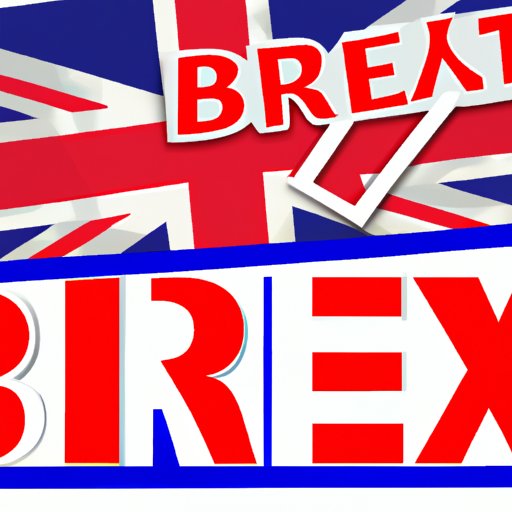I. Introduction
The vote for the United Kingdom to leave the European Union took the world by surprise in June 2016. This article aims to provide an in-depth analysis of the factors that led to the Brexit vote and its potential impact on the future of the UK and the EU.
II. Historical Overview of UK-EU Relations
The UK and the EU have a long and complicated history. The UK’s first attempt to join the predecessor of the EU, the European Economic Community, in 1963 was vetoed by the French President Charles de Gaulle. The country finally joined in 1973 after two more attempts. Since then, the UK has consistently been an influential member of the EU, proposing and opposing various policies over the years.
The turning point came in 2013 when the Conservative Party, led by David Cameron, promised an in-out referendum on EU membership if they won the next general election. Cameron won and delivered on that promise with the 2016 referendum, which resulted in 51.9% of voters choosing to leave the EU.
III. Economic and Political Factors for Leaving
Several economic and political factors led to the Brexit vote. One of the most significant factors was a desire for greater control over the UK’s laws and regulations. Leave campaigners argued that EU regulations stifled innovation, reduced competitiveness, and weakened the UK’s sovereignty. They also criticized the EU’s lack of democratic accountability and transparency.
Another major issue was immigration. Leave campaigners argued that unrestricted EU migration to the UK threatened jobs for UK citizens and put a strain on public services. They also criticized the EU’s inability to control its borders or reduce migration numbers.
IV. Perceived Benefits and Drawbacks of EU Membership
Before the referendum, both sides of the debate weighed the perceived benefits and drawbacks of EU membership. Those in favor of remaining argued that the EU provided essential economic benefits, including access to the EU’s single market, which allowed UK companies to trade freely across Europe without tariffs. The EU also provided legal protections for workers and consumers, and easy travel for UK citizens.
However, Leave campaigners argued that EU membership came at a great financial cost. The UK was one of the largest contributors to the EU budget, which they claimed was wasteful and non-transparent, with billions of pounds going to waste each year. They also argued that the UK would be able to negotiate its own trade deals post-Brexit, making the country more globally competitive.
V. Impact on Immigration policies and Travel
The Brexit vote has had a significant impact on immigration policies and travel between the UK and the EU. Following the vote, UK citizens lost their status as EU citizens, meaning they lost their right to live and work freely across the EU. The UK introduced a points-based immigration system, which aims to control the number and skills of immigrants entering the UK.
UK citizens also faced new travel restrictions, including longer lines and stricter border controls when traveling to the EU. They now require additional visas, work permits, and health insurance when visiting EU countries for business or pleasure.
VI. Effects on EU policymaking
The Brexit vote has had far-reaching implications for EU policymaking. It has emboldened anti-EU movements across other member states who perceive the EU as unaccountable and undemocratic. Some have called for their own referendums on EU membership, while others have demanded reforms to the EU institutions.
The Brexit vote has also made the EU more cautious about pursuing further integration, such as creating a fiscal union or deeper political integration. The EU is now focused on preserving its unity and stability while navigating a post-Brexit world.
VII. Future of UK-EU Relations
The future of UK-EU relations is still uncertain. The UK is currently negotiating a new trade deal with the EU, which will determine the terms of trade post-Brexit. The UK government has also signed trade agreements and joined new alliances with countries outside the EU, such as the US, Japan, and Australia.
Meanwhile, the EU is grappling with its own challenges, including the COVID-19 pandemic, climate change, and tensions with Russia and China. The EU is also working to integrate more closely on issues like defense, foreign policy, and migration.
VIII. Personal Perspectives
Behind the political rhetoric, there are personal perspectives on the Brexit vote. Some UK citizens voted for Brexit as a way of expressing their dissatisfaction with the political establishment and a desire for greater control. Others voted against it, concerned about the economic and social costs of leaving the EU.
Personal stories from those directly affected by Brexit reveal the deeply emotional and divisive impact of the vote. Immigrants living in the UK have faced uncertainty and hostility, while UK citizens living in the EU have had to navigate new and complex regulations.
IX. Conclusion
The Brexit vote has upended the UK’s relationship with the EU and created uncertainty for millions of people across Europe. While some see it as an opportunity to shape the country’s future, others fear the economic and social consequences of leaving the EU. Only time will tell how the Brexit vote will shape Europe’s future.
